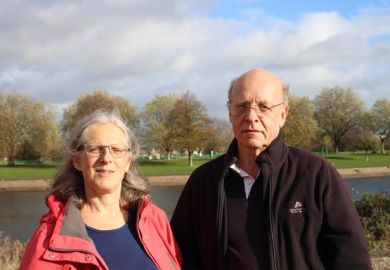Academics’ mental health has been undermined by the “cognitive dissonance” experienced when researchers dedicated to open inquiry find themselves working for closed institutions, Australian scholars have argued.
A new article blames academia’s rising mental health toll on universities’ refusal to allow staff to apply principles of academic inquiry to their own institutions.
“Values that an academic might seek…to uphold in one’s work – such as a commitment to reason, objectivity, public responsibility and the pursuit of knowledge – are routinely compromised, thwarted, trivialised or dismissed,” says the paper in the journal Social Alternatives.
“The very tools of critique and analysis that academics use to understand the world around them are simply not able to be applied in any meaningful way to their own employment circumstances.”
Academics are at the forefront of a Covid-induced mental health crisis, with many burnt out from their efforts to shift their work online. A UK survey last year found that the well-being of university staff was considerably lower than population norms.
But the paper says that the problem predates Covid and has been amplified by universities’ failure to permit scrutiny of their administrative decisions. It cites Monash University’s refusal to provide “rigorous enrolment data or financial modelling” to justify its abolition of internationally regarded musicology and theatre courses, and the removal of most of their teaching staff.
These “voluntary separations”, blamed on Covid cost pressures, occurred just months before the university registered an operating surplus of over A$250 million (£141 million).
Another example is Murdoch University’s litigation against governing council member Gerd Schröder-Turk, who went public with concerns over its international education practices.
And when leaked documents appeared to show that the University of Western Australia had predetermined the results of redundancy consultations, the university responded by reporting the “theft of confidential information” to police.
Lead author Peter Tregear blamed such tactics for the “prevalence of mental injury” in an occupation where “the pursuit of truth” was fundamental. “Facts matter; data matters; evidence matters,” said Professor Tregear, director of Little Hall in Melbourne and former head of the Australian National University School of Music. “That’s clearly going to come crashing into a brand-focused management style concerned instead with spin and image – where you’re expected to fall into line rather than speak truth to power.
“Your day-to-day workplace becomes anathema to your vocational calling. Your brain tries to rationalise the irreconcilable. These things become not just professional crises, but personal ones as well.”
The paper says that universities have adopted a “sector-wide culture of financial obfuscation”, while reported staffing figures beggar belief. “Academics are specifically…trained to question blanket assumptions and fallacious arguments,” it says. “Working under a false promise of a meaningful process of consultation, or misleading justifications for wholesale change, can be especially jarring.”
It says that university administrators “compound” academics’ distress by referring them to well-being or resilience programmes – implying that the shortcomings lie with the worker rather than the workplace. Change management programmes claim “a presumptive legitimacy and reasonableness” that brook no dissent.
“There is an a priori assumption that not only the change itself is necessary, but the way it is to be implemented is appropriate,” the paper says. “Change management processes arguably both generate and take advantage of staff distress to achieve their industrial goals.”
Register to continue
Why register?
- Registration is free and only takes a moment
- Once registered, you can read 3 articles a month
- Sign up for our newsletter
Subscribe
Or subscribe for unlimited access to:
- Unlimited access to news, views, insights & reviews
- Digital editions
- Digital access to THE’s university and college rankings analysis
Already registered or a current subscriber?








